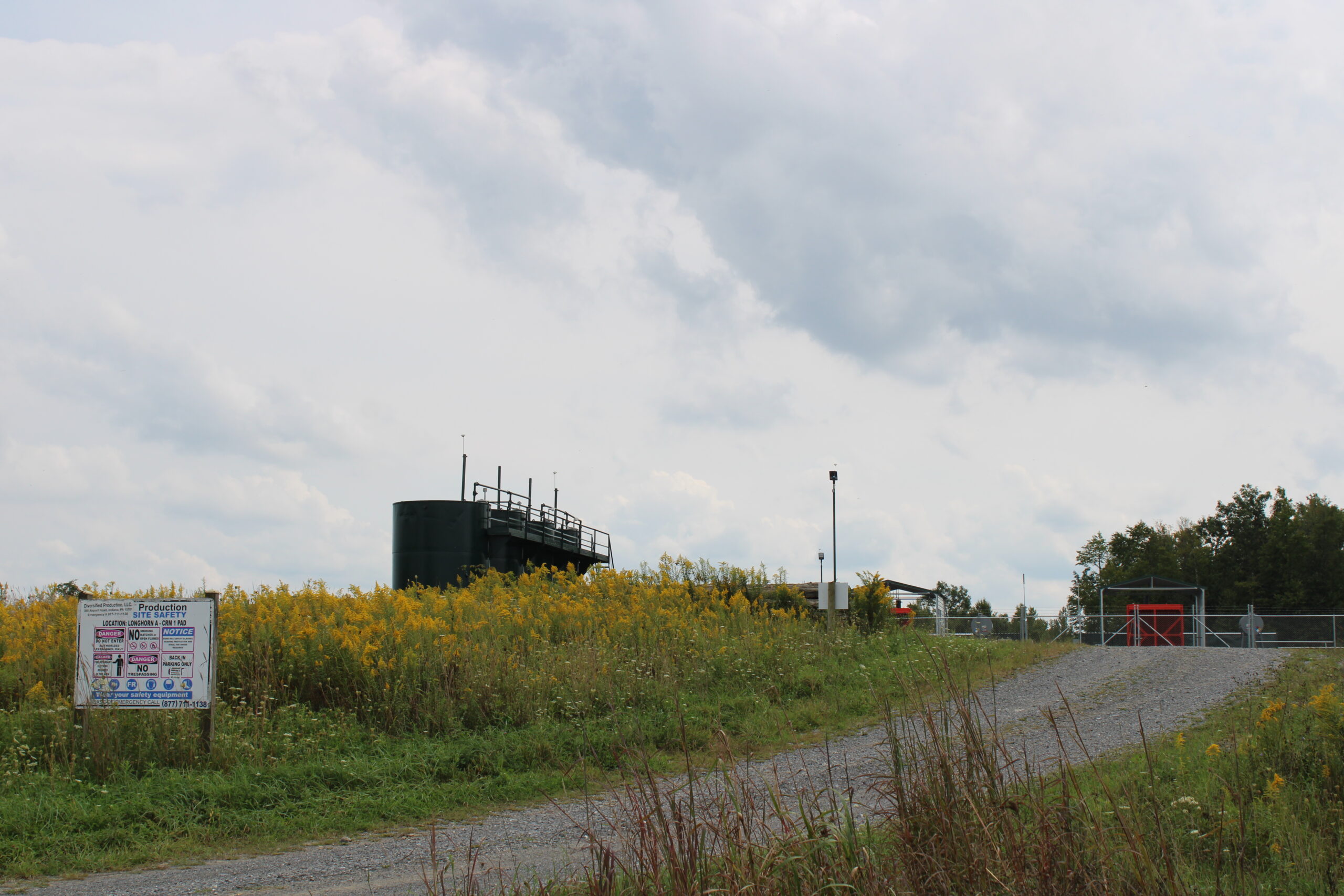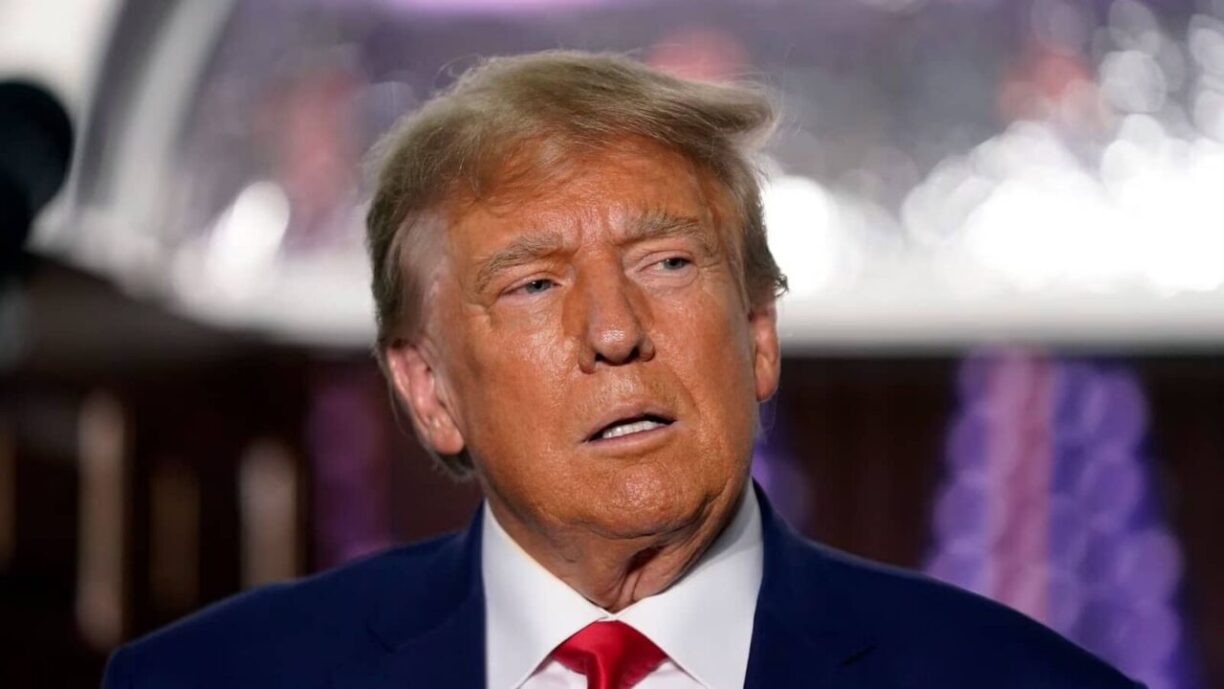News
In rural Pennsylvania, crypto mining offers a lifeline for dying gas wells • Pennsylvania Capital-Star

Holly May first heard the roaring noise during a youth hunting event on state game lands in the fall of 2022.
“It’s back a ways,” May said of the noise. “It was an area that I previously had liked to hunt in.” The plot of land, State Game Lands 44 in Pennsylvania’s northwest, was once home to a coal mine — since revegetated with native and pollinator-friendly plants and stocked with pheasants by the Pennsylvania Game Commission. Today, traces of its mining past are covered by tall, waving grasses and clusters of goldenrod flowers.
Getting to the site requires maneuvering up a treacherous gravel hill road and past a gate with a sign identifying the lessee of its mineral rights: Diversified Production LLC. Where the trees clear, grassland opens up, offering cover to the critters that May and others both hunt and protect.
But that fall day, finding pheasants was harder than usual. “It literally sound[ed] like you’re standing beside an airplane taking off,” she said.
May, a natural resources professional, wouldn’t find out until months later that the sound was coming from a different kind of mining operation than this land has grown accustomed to — one that searches for bitcoin.
The bitcoin mine sits atop a set of wells producing natural gas that — rather than being transported and sold — can be used to power banks of supercomputers that work around the clock to unlock cryptocurrency. Today, one bitcoin is worth around $67,000.
When May heard it roaring that day, the mine was up and running but without authorization from state regulators. The oil and gas producer Diversified had yet to secure the required permits to hook up the engines that power cryptocurrency mining on the low-producing fracking well pad, called Longhorn Pad A. Nonetheless, it ran for several weeks, one resident estimated.
Pennsylvania’s Department of Environmental Protection (DEP) later slapped the company with a notice of violation for breaking state air pollution and noise laws.
Then, without handing down any punishment, the regulators approved the mining operation in December.
The mine was the second Diversified site to be hit with a violation for operating without a permit. The agency took action as well at a neighboring site, Longhorn Pad C, which regulators discovered in March 2023. That site also received the necessary permits for bitcoin mining two months later. Diversified, which has acquired some 70,000 wells in less than a decade, has surpassed Exxon Mobil Corp. to become the largest well owner in the nation. Many of these wells are low-producing and represent a risk if the company can’t afford to plug them at the end of their lives.
The situation adds to the growing concern about a potential surge in bitcoin mining — and its potential to increase air pollution — throughout Pennsylvania. Across the country, crypto mining is blamed for producing millions of tons of carbon dioxide and consuming vast amounts of electricity — more than some entire countries.
“We have invested tens of thousands of dollars in habitat work on that game lands,” May said. “Now, it’s really disturbing to use that whole back section … not to mention the greenhouse gas emissions.”
In issuing permits for the site, the DEP opted not to put a cap on its greenhouse gas emissions, noting that the site is not a “major” source of emissions relative to other polluters in the state, such as power plants. But the department did place a noise limit on the mine, even though Horton Township, where the mine is located, had already adopted a bitcoin mining ordinance that limited noise. PJ Piccirillo, a supervisor in Horton Township, said he was never contacted by Diversified Energy about the site throughout the entire permitting process.
The agency also forgave the company’s infractions in granting the permit, saying that Diversified had “satisfactorily addressed violations.”
Mining has returned to state game lands in Pennsylvania, but this time operators are mining for crypto currency (Audrey Carleton/Capital and Main)
In an email to Capital & Main, the DEP said Diversified has not yet started full-time operation of the bitcoin mine at Longhorn A because it has yet to install the “sound mitigation devices” its permit requires.
The bitcoin operations point to a gap in regulatory oversight that has allowed operators such as Diversified to fire up their engines without being fully transparent about their plans or communicating with local communities about the potential impact of their operations, interviews and government emails obtained through Right-to-Know requests show. Regulators often lack the bandwidth to properly monitor all infractions, especially in rural areas, and oversight can be fractured — in the case of Longhorn Pad A, requiring input from three different agencies that don’t often communicate with one another.
“The permit applicant here has a bad track record in Pennsylvania,” said Robert Routh, Pennsylvania’s senior policy advocate for the Natural Resources Defense Council (NRDC), which filed a complaint opposing the mine last July alongside Earthjustice and the Clean Air Council.
“It appears they lack both the intent or the ability to comply with Pennsylvania law.”
From bituminous to Bitcoin
In a process known as “wellhead mining,” Diversified’s Longhorn Pad A funnels natural gas from two fracking wells directly into engines that power banks of supercomputers. Disconnected from the grid, the mine can churn away on its own around the clock.
Diversified hadn’t owned the pad for very long before it took steps to turn it into a bitcoin mine. The company acquired the wells in November 2020 and formally applied to mine bitcoin there in June 2022. It powered up the mines the following October and operated for several weeks, according to resident complaints and emails reviewed by Capital & Main.
As the DEP’s permitting process was underway, staff at the Pennsylvania Game Commission expressed frustration that Diversified was not fully answering inquiries about their activities at the well site. Though the company’s permit applications on Longhorn Pads A and C clearly expressed its intent to mine bitcoin, early emails obtained by Capital & Main show company representatives were vague in communicating their plans to both agencies, referring to the mine as “containers” housing “computer equipment.”
After finally meeting with the Game Commission, a Diversified executive offered to “partner” on projects for the agency, such as tree planting efforts and winter coat drives.
Both well pads house marginal, or low-producing, wells, which Diversified acquired from Pittsburgh-based fracking giant EQT in 2020. The wells had been inactive for around a decade before Diversified brought them back to life.
A highly energy-intensive process, bitcoin mining runs the risk of producing a surge in the state’s greenhouse gas emissions. Using what’s called the proof-of-work algorithm, bitcoin miners mint new coins by chipping away at complex mathematical equations. A September 2022 report from the Biden administration estimates that crypto operations are now responsible for 0.4% to 0.8% of the nation’s total greenhouse gas emissions. Bitcoin mining also generates localized air and water pollution as well as electronic waste, the report notes. Cooling the computers, which must remain at a set temperature, also requires vast water usage, which could strain drought-prone areas.
In its application for permits to add crypto-related generators to Longhorn A, Diversified predicted the site’s emissions of air pollutants, such as particulate matter and volatile organic compounds, would multiply by as much as 67 times once it began mining bitcoin.
Wells such as Longhorn A — which for most operators would be economically worthless since they lack pipeline capacity to transmit any gas they produce — are a model for giving new life to aging wells. Bitcoin mining offers them a new revenue stream and, as one bitcoin mine operator wrote in a 2023 blog post, going off-grid comes with a suite of “superpowers,” including the ability to relocate quickly and to “operate permissionlessly.”
 The road in Weedville, Pa., just a few miles from Longhorn Pad C. (Audrey Carleton/Capital and Main)
The road in Weedville, Pa., just a few miles from Longhorn Pad C. (Audrey Carleton/Capital and Main)
The specter of a bitcoin gold rush in Pennsylvania seems to have caught regulators by surprise, interviews and documents obtained via Right-to-Know requests show. Thousands of low-producing wells are estimated to be scattered across the commonwealth, and environmentalists fear they could become targets for an emerging, hard-to-control industry.
‘Big picture, we don’t ever want to see another one of these’
In Horton Township, Piccirillo said he first heard complaints from residents in the fall of 2022. At first he couldn’t explain the noise or the sudden increase in truck traffic on the road leading to Longhorn Pad A. That is, until he and his fellow supervisors went to the site to see for themselves. The bitcoin mine was up and running on his first visit, shut off on his second, he said.
Minutes from Horton Township Board of Supervisors meetings show the mine came up repeatedly between August and October of 2022. Around a year later, the township passed an ordinance requiring that, before operating, bitcoin mines be housed in a “fully enclosed” building that would keep noise emissions below 50 decibels (roughly the noise level of a refrigerator) from the closest property line; and receive approval through a local permitting process. After visiting the site this past March, Piccirillo said the company still had not enclosed the mine in a soundproof building.
Around the same time that Piccirillo began fielding resident complaints, Dave Gustafson, director for the Bureau of Wildlife Habitat Management at the Pennsylvania Game Commission, started looking for answers as well. At first, none came. “We went back and forth, and over the next several months throughout the summer [of 2022], tried to reach out and find out, ‘Well, what are they exactly doing?’” he said. “They really didn’t tell us.”
Gustafson recalled that early correspondence from company representatives was vague. “They were very careful to say that what they were doing had to do with production and post-production of gas,” he said. “That’s careful language.”
The company took a similar tack in corresponding with the DEP. In April 2023, after the DEP hit Diversified with a violation for firing up its bitcoin mine on Longhorn C without permission, a company vice president pushed back. “We do not agree with this determination,” the executive wrote in an email, arguing that the engines at the site actually “provide power for oil and gas operations.” (The engines Diversified were cited for using are the same models the company noted in its permit application would be “associated with mining of crypto currency operations.”)
Meanwhile, emails show Diversified was slow to reply to agency queries, sometimes delaying answers to questions and plans to meet by weeks. An internal Game Commission memo noted that Gustafson emailed Diversified “requesting details of what was being developed on the Longhorn A pad” on Sept. 1, 2022. More than four months later, the memo said, “We had still not received a written response and only managed to get 1 phone conversation.”
 Fog hangs on the hillsides above the road to Longhorn Pad C (Audrey Carleton/Capital and Main)
Fog hangs on the hillsides above the road to Longhorn Pad C (Audrey Carleton/Capital and Main)
As the bitcoin mines began operating, the Game Commission fielded its first complaints.
The situation presented a quandary for the state’s regulatory bodies, which appeared not to have communicated with each other about their shared experience with Diversified until July of 2023, records show. When a third agency — the Department of Conservation and Natural Resources — weighed in, another point of view emerged. “Our position is that [bitcoin mining] is certainly not permissible under our lease,” the department wrote in emails obtained by Capital & Main.
It took months for Gustafson to get the chance to arrange a visit to Longhorn A with Diversified representatives, because the company didn’t offer “a lot of good-natured or good partnerly communication,” he recalled last October. “We disagree, still to this day, about certain rights that they assert that they have, that we don’t believe that they have.”
“Big picture,” he continued, “we don’t ever want to see another one of these. We don’t even want this one there.”
Gustafson concedes that since getting in touch with Diversified’s staff, the company has agreed to several key compromises — including shutting down the bitcoin mine on peak hunting days. Emails also show that, after meeting with Gustafson, in the wake of months of delay, Diversified Chief Financial Officer Brad Gray offered to “partner with your organization to get some great projects completed,” highlighting that the company had previously sponsored tree-planting initiatives, fishing explorations, playground construction projects and winter coat drives for other entities.
The violations at the two Longhorn pads tops a list of 19 others the company admitted to in its permit applications for the Longhorn sites. Those violations should have been enough to derail Diversified’s application to mine bitcoin, Routh, the NRDC policy advocate, and the nonprofit environmental groups Clean Air Council and Earthjustice said in a public comment filed in opposition to the mine.
In response, the DEP said that “Diversified had worked with DEP to satisfactorily address violations occurring at other facilities the company operates.” They said this when permitting both Longhorn A and Longhorn C, but did not specify what steps the company had taken.
“The department offers a get-out-of-jail free card to Diversified and to any other polluters who don’t bother to apply for a permit,” Charles McPhedran, senior attorney in Earthjustice’s clean energy program, told Capital & Main. “The incentive for industry is to do whatever it wants.”
Capital & Main reached out to Diversified Energy PLC, the parent company to Diversified Production, with a list of questions. While it did not respond to specific questions, it offered a statement in response.
“As part of our well optimization efforts, we undertook a pilot research program to study on-site cryptocurrency mining activities as a solution for stranded assets. Throughout the process, we have sought guidance and worked closely with the Department of Environmental Protection and Game Commission,” the statement reads. “Across our operations, we strive to be good stewards of our assets, focused on innovative solutions to best use resources while minimizing environmental impact and improving performance.”
The Department of Environmental Protection did not respond to a list of questions from Capital & Main.
For May, the hunter who has now stopped frequenting State Game Lands 44 in favor of quieter grounds, this type of operation has real-life consequences.
“It’s super frustrating to watch a private company come in and be a repeat offender,” said May.
News
How Ether Spot ETF Approval Could Impact Crypto Prices: CNBC Crypto World

ShareShare article via FacebookShare article via TwitterShare article via LinkedInShare article via email
CNBC Crypto World features the latest news and daily trading updates from the digital currency markets and gives viewers a glimpse of what’s to come with high-profile interviews, explainers and unique stories from the ever-changing cryptocurrency industry. On today’s show, Ledn Chief Investment Officer John Glover weighs in on what’s driving cryptocurrency prices right now and how the potential approval of spot ether ETFs could impact markets.
News
Miners’ ‘Capitulation’ Signals Bitcoin Price May Have Bottomed Out: CryptoQuant

According to CryptoQuant, blockchain data shows signs that the Bitcoin mining industry is “capitulating,” a likely precursor to Bitcoin hitting a local price bottom before reaching new highs.
CryptoQuant analyzed metrics for miners, who are responsible for securing the Bitcoin network in exchange for newly minted BTC. As outlined in the market intelligence platform’s Wednesday report, multiple signs of capitulation have emerged over the past month, during which Bitcoin’s price has fallen 13% from $68,791 to $59,603.
One such sign includes a significant drop in Bitcoin’s hash rate, the total computing power that backs Bitcoin. After hitting a record high of 623 exashashes per second (EH/s) on April 27, the hash rate has fallen 7.7% to 576 EH/s, its lowest level in four months.
“Historically, extreme hash rate drawdowns have been associated with price bottoms,” CryptoQuant wrote. In particular, the 7.7% drawdown is reminiscent of an equivalent hash rate drawdown in December 2022, when Bitcoin’s price bottomed at $16,000 before rallying over 300% over the next 15 months.
This latest hash rate drop follows Bitcoin’s fourth cyclical “halving” event in April, which cut the number of coins paid out to miners in half. According to CryptoQuant’s Miner Profit/Loss Sustainability Indicator, this has left miners “mostly extremely underpaid” since April 20, forcing many to shut down mining machines that have now become unprofitable.
CrypotoQuant said that miners faced a 63% drop in daily revenue after the halving, when both Bitcoin block rewards and transaction fee revenues were much higher.
During this time, Bitcoin miners were seen moving coins from their on-chain wallets at a faster rate than usual, indicating that they may be selling their BTC reserves“Daily miner outflows reached their highest volume since May 21,” the company wrote.
Among the sales of Bitcoin miners, whales and national governmentsBitcoin’s price drop in June also hurt Bitcoin’s “hash price,” a metric of Bitcoin Miner Profitability per unit of computing power.
“Average mining revenue per hash (hash price) continues to hover near all-time lows,” CryptoQuant wrote. “Hashprice stands at $0.049 per EH/s, just above the all-time low hashprice of $0.045 reached on May 1st.”
By Ryan-Ozawa.
News
US Congressman French Hill Doubles Down on Trump’s Pro-Crypto Stance

US lawmaker French Hill has noted that Donald Trump will take a more pro-crypto approach than the current administration. The run-up to the presidential election has seen cryptocurrencies become an issue with lawmakers making huge statements ahead of the polls. Donald Trump has also been reaching out to the industry, making a pro-crypto case.
French Hill Backs Trump’s Pro-Crypto Stance
Republican Congressman French Hill has explained the type of cryptocurrency regulatory framework he believes Donald Trump could adopt in the country. In a recent interview with CNBC, French Hill said that the recently passed FIT21 bill is the type of regulatory framework the Trump administration will adopt in the sector.
#FIT21 passed the House with 71 Democratic votes, it’s exactly the kind of digital asset regulatory framework former President Trump would support if re-elected.
See more on @SquawkCNBC🔽 photo.twitter.com/ceTmU4LApU
— French Hill (@RepFrenchHill) July 3, 2024
THE FIT21 Bill It is intended to protect investors and consumers in the market by establishing clear rules and powers for the various regulators in the sector. According to Hill, Trump will adopt it because it directs the Securities and Exchange Commission (SEC) and the Commodity Futures Trading Commission (CFTC) on the specific regulatory framework needed in the market.
“… for people who are innovating and starting a crypto token, a related business, custody of those assets, how to ensure consumer protection, so I think that framework is the right approach and that’s what I’m going to recommend to the President to pass, which is that we have not passed it between now and the end of this Congress.”
He also called Trump an innovative and pro-growth president in financial matters.
Cryptocurrency is going mainstream
This election cycle saw the cryptocurrency industry taking a place in mainstream issues following broader adoption across demographics. From candidates moving toward enthusiasts to recent pro-Congress legislation, cryptocurrencies have become a rallying point for officials. The U.S. regulatory landscape has been criticized for stifling growth due to frequent SEC LawsuitsThis has led executives to push for pro-cryptocurrency laws and raise money for pro-industry candidates.
Read also: Federal Reserve Predicts “AI Will Be Deflationary” to Stimulate Economy
David is a financial news contributor with 4 years of experience in Blockchain and cryptocurrency. He is interested in learning about emerging technologies and has an eye for breaking news. Keeping up to date with trends, David has written in several niches including regulation, partnerships, cryptocurrency, stocks, NFTs, etc. Away from the financial markets, David enjoys cycling and horseback riding.
News
US Court Orders Sam Ikkurty to Pay $84 Million for Cryptocurrency Ponzi Scheme

A federal court has ordered Jafia LLC and its owner, Sam Ikkurty, to pay nearly $84 million to cryptocurrency investors after ruling that the company was operating a Ponzi scheme.
The ruling, issued by Judge Mary Rowland in the U.S. District Court for the Northern District of Illinois, follows a lawsuit filed by the Commodity Futures Trading Commission (CFTC) in 2022 after the fund collapsed.
Judge Rowland found that Ikkurty, based in Portland, Oregon, did numerous false claims on his company’s hedge funds.
These included misleading statements about his trading experience and the promise of high and stable profits. Instead, Ikkurty used funds from new investors to pay off previous investors, a hallmark of a Ponzi scheme.
The Ponzi Scheme
The court found that Ikkurty misappropriated investment funds for personal use without the knowledge of the investors. These funds were used for personal use and were reported as Fraudulent Investmentscausing significant financial losses to customers.
This non-transparent operation violated Transparency Commission regulations, which led to the imposition of a hefty fine to compensate defrauded investors and restore some public confidence in the financial system.
Judge Rowland emphasized that fraudulent activity such as this violates the law and undermines the integrity of modern financial markets. The $84 million award seeks to address the financial harm inflicted on investors and reinforce the importance of legal compliance in cryptocurrency trading.
-

 Videos9 months ago
Videos9 months agoBitcoin Price AFTER Halving REVEALED! What’s next?
-

 Bitcoin8 months ago
Bitcoin8 months agoBitcoin Could Test Record Highs Next Week in ETF Flows, Says Analyst; Coinbase appears in the update
-

 Videos9 months ago
Videos9 months agoAre cryptocurrencies in trouble? Bitcoin Insider Reveals “What’s Next?”
-

 Videos9 months ago
Videos9 months agoCryptocurrency Crash Caused by THIS…
-

 Videos8 months ago
Videos8 months agoThe REAL reason why cryptocurrency is going up!
-

 Altcoin8 months ago
Altcoin8 months agoThe best Altcoins to buy before they rise
-

 Videos9 months ago
Videos9 months agoBlackRock Will Send Bitcoin to $116,000 in the Next 51 Days (XRP News)
-

 Videos9 months ago
Videos9 months agoDonald Trump: I like Bitcoin now! Joe Biden HATES cryptocurrencies.
-

 Videos8 months ago
Videos8 months agoSolana Cryptocurrencies: the future WILL SHOCK you | What comes next?
-

 News9 months ago
News9 months agoTON, AKT, AR expect increases of 15%+ as the market stabilizes
-

 Videos8 months ago
Videos8 months agoBitcoin Whale REVEALS: The 5 Best Coins to Make You a Millionaire!
-

 Videos8 months ago
Videos8 months agoBREAKING NEWS: The 19 best cryptocurrencies ready to skyrocket!












